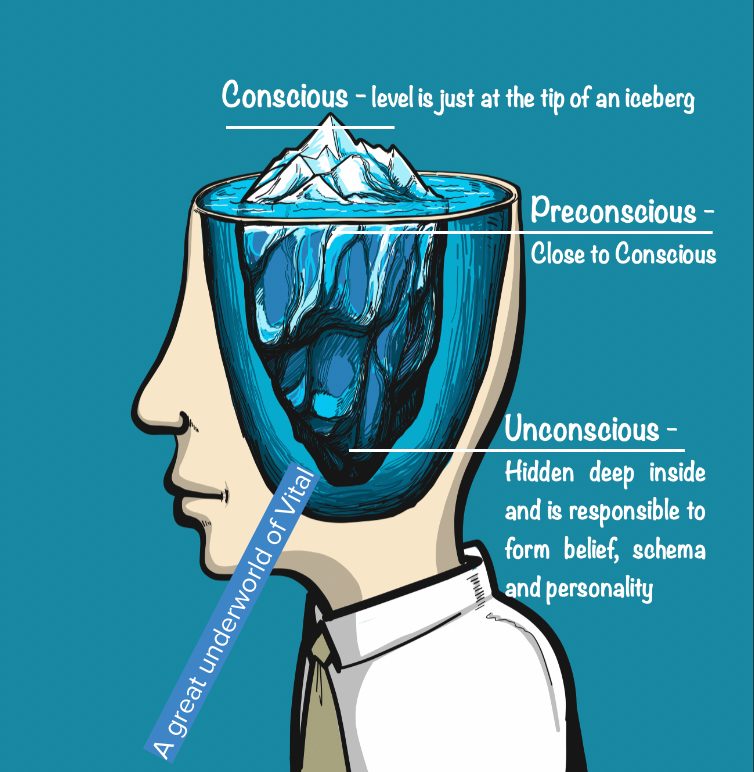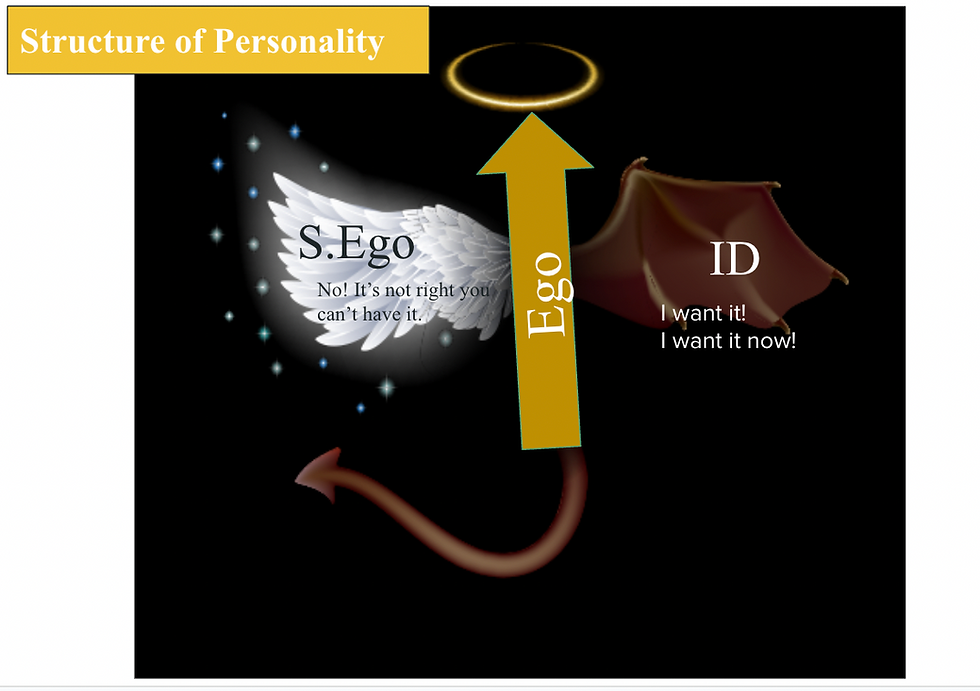Sigmund Freud, the founder of psychoanalysis, believed that conflicts arise from the interaction between different parts of the mind, particularly the conscious and unconscious mind. He believed that the human mind is composed of three parts: the conscious mind, the preconscious mind, and the unconscious mind.

According to Freud, conflicts can arise between the conscious and unconscious mind when repressed or suppressed feelings, desires, or memories from the unconscious mind try to emerge into the conscious mind. These conflicts can cause anxiety, guilt, or other negative emotions, and can lead to psychological problems.
Freud also believed that conflicts can arise within the unconscious mind itself, particularly between the id (the instinctual, pleasure-seeking part of the mind) and the superego (the part of the mind that represents morality and societal norms). These conflicts can lead to inner turmoil and psychological distress.
In addition, Freud believed that conflicts can arise between the individual's unconscious desires and the demands of the external world. For example, a person may have unconscious desires for power or control, but the demands of society may require them to behave in a more cooperative or submissive manner. These conflicting demands can create tension a
nd stress.
Overall, Freud believed that conflicts are an inherent part of the human psyche, and that they can arise from a variety of sources, including within the individual's own mind and from external demands and expectations. By exploring and resolving these conflicts, individuals can achieve greater psychological health and well-being.

Different types of conflicts, their causes, and possible cures:
Internal conflict: This type of conflict arises within an individual, usually between the conscious and unconscious parts of the mind, or between conflicting desires or values. Causes can include repressed emotions, unresolved trauma, or conflicting goals. To cure internal conflicts, individuals may need to engage in therapy, such as psychoanalysis, cognitive-behavioral therapy, or other forms of talk therapy.
Interpersonal conflict: This type of conflict arises between two or more individuals, usually due to differences in opinions, values, or behaviors. Causes can include misunderstandings, personality clashes, or power struggles. To cure interpersonal conflicts, individuals may need to engage in conflict resolution techniques, such as mediation, negotiation, or assertiveness training.
Organizational conflict: This type of conflict arises within a group or organization, usually due to differences in goals, values, or interests. Causes can include power struggles, resource allocation issues, or communication breakdowns. To cure organizational conflicts, leaders may need to engage in conflict management strategies, such as team-building exercises, conflict resolution training, or organizational restructuring.
Societal conflict: This type of conflict arises between different groups or communities within a larger society, usually due to differences in cultural or religious beliefs, political ideologies, or socioeconomic status. Causes can include discrimination, inequality, or historical grievances. To cure societal conflicts, individuals and leaders may need to engage in dialogue, education, and policy change.
Parental conflict: Refers to any type of disagreement or dispute between parents, whether married, separated, or divorced. This conflict can take many forms, such as arguments, criticism, withdrawal, or physical violence. Parental conflict can have a negative impact on children, who may feel caught in the middle or experience emotional distress as a result of their parents' disagreements.
Parental conflict can be caused by a variety of factors, including differences in parenting styles, financial stress, infidelity, or unresolved emotional issues. In some cases, parental conflict may arise due to unresolved issues from the parents' own childhoods, such as trauma or attachment issues.
The negative effects of parental conflict on children can include anxiety, depression, behavioral problems, and academic difficulties. Children may also experience a sense of insecurity or instability, especially if the conflict leads to separation or divorce.
To address parental conflict, parents may need to engage in therapy, either individually or as a couple. This can help them to identify the root causes of their conflict, develop effective communication strategies, and learn coping skills to manage stress and emotions. In addition, parents may need to make changes to their parenting styles, such as adopting a more cooperative approach or seeking outside support, such as from family members or community resources. Ultimately, the goal of addressing parental conflict is to promote a more stable and secure environment for children to grow and develop.
In general, the cure for conflicts involves identifying the root causes and addressing them through effective communication, empathy, and collaboration. In some cases, therapy or conflict resolution training may be necessary to help individuals or groups overcome deeply ingrained patterns of conflict. Ultimately, the key to resolving conflicts is a willingness to listen, understand, and find common ground.
Elabroting more on conflicts
According to Sigmund Freud's psychoanalytic theory, conflicts refer to inner struggles that arise from competing psychological forces within an individual's mind. These conflicts often involve the clash between unconscious desires, societal norms, and defense mechanisms. Freud identified several types of conflicts, including intrapsychic conflicts, psychosexual conflicts, and reality-based conflicts. Let's explore these types of conflicts with examples:
Intrapsychic Conflicts: Intrapsychic conflicts occur within the individual's psyche and involve competing desires, needs, or fears. Freud identified three main types of intrapsychic conflicts:
a. Id-Ego Conflict: This conflict arises between the primitive, pleasure-seeking instincts of the id and the reality-oriented constraints of the ego. For example, an individual may experience conflict between the immediate gratification of their desires (id) and the rational consideration of long-term consequences (ego).
b. Ego-Superego Conflict: The ego, which balances the id and the superego, can experience conflicts between the individual's moral values and societal norms (superego) and their own personal desires (id). For instance, an individual may feel guilty about pursuing their own ambitions due to societal expectations (superego).
c. Pleasure-Reality Conflict: This conflict arises when an individual's instinctual desires clash with the limitations and demands of reality. For example, someone may experience conflict between their desire for leisure and their responsibilities at work or home.
Psychosexual Conflicts: Freud proposed that conflicts could also arise during the psychosexual stages of development, which involve the progression through different stages of sexual energy focus. If there are unresolved issues or fixations at a particular stage, it can lead to conflicts in adulthood. Here are a few examples:
a. Oral Stage Conflict: During the oral stage (0-1 year), conflicts may arise if an individual experiences excessive dependency or neglect, leading to an oral fixation. This fixation can manifest as excessive dependence on others or a tendency to be overly self-reliant.
b. Phallic Stage Conflict: The phallic stage (3-6 years) involves the Oedipus complex, where conflicts arise from a child's sexual desires for the opposite-sex parent and rivalry with the same-sex parent. Unresolved Oedipal conflicts can lead to challenges with relationships, intimacy, or unresolved feelings of guilt or inadequacy.
c. Genital Stage Conflict: During the genital stage (puberty onward), conflicts may arise as individuals navigate sexual desires and societal expectations around relationships and intimacy. For instance, an individual may struggle with commitment due to fear of intimacy or unresolved past experiences.
Reality-Based Conflicts: Reality-based conflicts emerge from external factors and the demands of the external world. These conflicts often involve tensions between an individual's desires or wishes and the limitations imposed by the environment. Here are a few examples:
a. Work-Life Balance: Conflict may arise when an individual's desire for career success clashes with the need for personal or family time, resulting in a work-life imbalance.
b. Social Expectations: Conflicts can arise when societal expectations or cultural norms clash with personal values or aspirations. For instance, choosing between pursuing one's passion or conforming to family or societal expectations.
c. Interpersonal Conflicts: Conflicts in relationships can emerge from differing goals, values, or communication styles. These conflicts can involve issues such as power dynamics, intimacy, trust, or conflicts in decision-making.
It's important to note that conflicts are a normal part of human experience, and their resolution often contributes to personal growth and psychological well-being. Psychoanalytic therapy aims to explore and resolve these conflicts to alleviate distress and promote psychological integration.


Komentarai